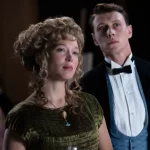AFI Fest 2022: Vibes, by Scott Nye

Vibes are the most elusive object of cinephilic desire. Rarely the stuff of either awards-seekers or ticket-sellers, these movies that drift and wander through a particular groove, which must sustain an entire feature, are not a natural venue for much plot, which is at best a secondary concern to the real appeal of the picture.
When I put together my schedule of what to see, there were of course a number of must-see films from directors I love (and I’ll write about those soon I’m sure), but every festival, when attended thoroughly, has time slots filled with entirely unknown quantities that the dogged viewer must choose between. In past years, priority has fallen to films without distribution; films that, when researched, are well-liked by trusted friends and colleagues; or from directors about whom I’ve heard much. I did away with all that this year and went purely for vibes, and was richly rewarded, quite immediately, by my first three selections.
Purely in terms of girth, the first slot of the festival was the most daunting – three films that were all around two-and-a-half hours – but who am I to resist an “expansive hybrid docufiction of dystopia and rebellion” about “a fearsome all-female biker gang, operating a black-market gasoline enterprise by illegally siphoning oil from the militarized government and selling it to other local bikers”? Joana Pimenta and Adirley Queirós’s Dry Ground Burning fulfills its promise rather immediately and frequently. There’s a lot of fire that seems to erupt from the ground itself. By the time the oil-siphoning kicks in, the film becomes a soundscape of metallic grinding, thick liquid gooping, crackling flame, and motors revving. Joana Darc Furtado and Léa Alves da Silva star as the sisters in question, apparently playing versions of themselves – American distributor Grasshopper’s entry on the film is entirely devoted to da Silva recounting how they really did this in 2019, making not only an economic but a political impact in the process. The authenticity they bring to the film is not just in fact but attitude, the certainty that they can get away with it, and the slight unease that comes from inexperienced actors attempting to play themselves providing a nice countertexture to that confidence.
Some slight technological unusualities suggest a sense of futurism at work, but the references to and eventual immersion in a rally for recently-ousted President Jair Bolsonaro ensure there’s no missing its reflection of contemporary Brazil. I’m not going to affect a deep knowledge of Brazilian politics here, except to note that Bolsonaro made headlines around the world when he rolled back protections on the Amazon rainforest, virtually threatening to level it if he could, and the sense of environmental desperation the title suggests pervades the hot, sweaty, dusty film. The plot is maybe too inactive to sustain the vibe across its expansive running time, and I struggled to make certain connections from moment to moment, only to be bowled away minutes later by a traveling road shot, musical number, biker rally, or fiery political speech.
I was more immediately and consistently taken with Ann Oren’s feature debut, Piaffe, which, in simple terms, is the movie about a woman who grows a horsetail. Eva (Simone Bucio) – the woman in question – has more immediate problems before the tail comes into play though. She awakes one day to find her sister Zara (Simon(e) Jaikiriuma Paetau) has abandoned her foley studio amidst a tight deadline. The director is on the phone that very moment asking for the sound effects for what we soon find out is a side-effect-nightmare drug called Equili that has chosen a rider and horse as the key subject for its commercial. Like most films dealing with sound design (he says, as though there’s a really rich tapestry of them), it relishes the inventive- and silliness inherent to the line of work, as Eva desperately wallops shoes and coconut shells against sand while churning a thick gold necklace around in her mouth to approximate the associated noises one hears when horses gallop by.
Zara, we learn, has suffered some sort of breakdown and is confined to a facility with limited visiting hours, largely stranding Eva. Though clearly not as far on the brink, Eva is less naturally confident than Zara, and Bucio plays well the distress of trying to succeed at an unfamiliar line of work. That it’s something as physically silly as this, and serving something as morally outrageous as the pharmaceutical industry, and that the director resembles a blonde version of Will Ferrell’s miniature-cell-phone-wielding Jeffrey’s manager lets Oren run with a sense of absurdity that serves as both a counter and an enhancer for Bucio’s sincere commitment.
By the time the tail starts emerging, Eva begins to come into her own, turning the body-horror genre on its head towards a sense of maturity or self-realization. The film’s careful balance of surreal comedy and earnest sexuality would feel too calculated if not for its aesthetic experimentation, which seems to at times be ready to let the film combust. It’s a shame, of course, that this film will only ever be available digitally. Carlos Vasquez’s 16mm photography is not only a richly-saturated feast, but his tendency towards unexpected handheld movements and letting the film run out towards the ends of shots reminded me of the thrilling play indulged in the last decade of regular celluloid use. Moves like that just hit different when the audience might suspect it could easily be a problem with their own print or projector, never mind the compounding complications that come up as the prints are continually reused.
Helena Wittmann also uses 16mm to drive the vibes in her super-laid-back-yet-aggressively-titled Human Flowers of Flesh, a film about some people on a boat. Really and truly. Festival plot descriptions let on more than I picked up, so maybe it was just this viewer’s lacking perception, but none of that prevented a very chill, enjoying time, watching Angeliki Papoulia (most famous ‘round these parts for several Yorgos Lanthimos collaborations) sail the Mediterranean and soak in the sun, the sea, the rocks, and the ship hands. One can attribute it to “the female gaze” if we want to stay heteronormative, but whatever the drive, Wittmann embraces the chance to eroticize these strapping young men strapping their ship, obscuring their dialogue and making their bodies an extension of the outrageously gorgeous environment.
And yeah, that’s about all I got. There are several ties to Claire Denis’ Beau travail, including a late cameo from Denis Levant, just as buttoned-up as he was there (well except for that film’s ending of course), so maybe there’s something about colonialism or repressed sexuality that it’s tying together. Couldn’t tell you. I was in it for the waves, and on that count, can highly recommend it.





























